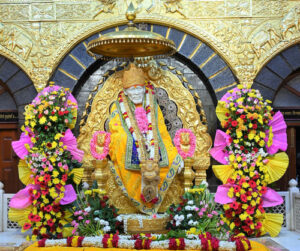
Sai Satcharitra is a spiritual text that chronicles the life and teachings of Shirdi Sai Baba, a revered Indian saint who lived in the late 19th and early 20th century. It is considered one of the most important texts for devotees of Sai Baba and is often used as a guide for spiritual practice.
The text was compiled by Hemadpant, a devotee of Sai Baba, who wrote down his experiences with the saint over a period of several years. The book is divided into 51 chapters and contains stories of miracles and teachings of Sai Baba, as well as his interactions with devotees and disciples.
The first chapter of the book provides an introduction to Sai Baba, describing his birth and early life, and the circumstances under which he came to Shirdi. The subsequent chapters are divided into different themes, such as the power of faith, the importance of charity, and the nature of the guru-disciple relationship.
One of the key themes of the book is the power of Sai Baba’s grace, which is said to have the ability to transform the lives of those who seek his help. The stories in the book illustrate this power, with many devotees experiencing miraculous healings and blessings after praying to Sai Baba.
Another important theme of the book is the importance of selfless service and devotion to God. Sai Baba is described as a living embodiment of this ideal, and the book emphasizes the need for devotees to follow in his footsteps by serving others and practicing devotion to God.
Throughout the book, Sai Baba’s teachings are presented in the form of parables and stories, which are meant to convey spiritual truths in a simple and accessible way. These stories often feature characters from different religious traditions, highlighting the universality of Sai Baba’s teachings and his ability to bring people of different backgrounds and faiths together.
The book also includes several passages that describe the nature of God and the spiritual path. Sai Baba is described as an incarnation of God, who has come to guide humanity towards spiritual awakening. His teachings emphasize the need to cultivate virtues such as humility, detachment, and love, in order to progress on the spiritual path.
One of the most famous stories in the book is the story of the millionaire and the poor woman. In this story, a wealthy man comes to Shirdi seeking Sai Baba’s blessings. When he arrives, he sees a poor woman begging for food and decides to give her a small amount of money. Sai Baba observes this interaction and asks the man why he only gave the woman a small amount, when he himself is a millionaire. The man is embarrassed and realizes that he has not been truly generous. Sai Baba then teaches him the importance of giving selflessly, without expecting anything in return.
Another well-known story from the book is the story of the four candles. In this story, four candles are lit in a room, representing different aspects of spiritual practice. The first candle represents faith, the second represents patience, the third represents devotion, and the fourth represents love. As the story unfolds, each candle goes out one by one, until only the candle of love remains. Sai Baba explains that love is the most important quality on the spiritual path, as it encompasses all other virtues.
The Sai Satcharitra is considered a sacred text by devotees of Sai Baba, and is often used in worship and meditation. It is believed that reading the book with devotion and sincerity can bring about spiritual transformation and blessings from Sai Baba.
In conclusion, the Sai Satcharitra is a spiritual text that provides guidance and inspiration to those seeking a deeper understanding of the teachings of Sai Baba. It emphasizes the power of faith, the importance of selfless service and devotion, and the universal nature of spiritual truths. The book continues to be a source of inspiration and guidance for millions of devotees around the world, who look to Sai Baba as a source of comfort and spiritual support.
For in-depth details you can download the book, Sai Satcharitra Malayalam PDF given below.